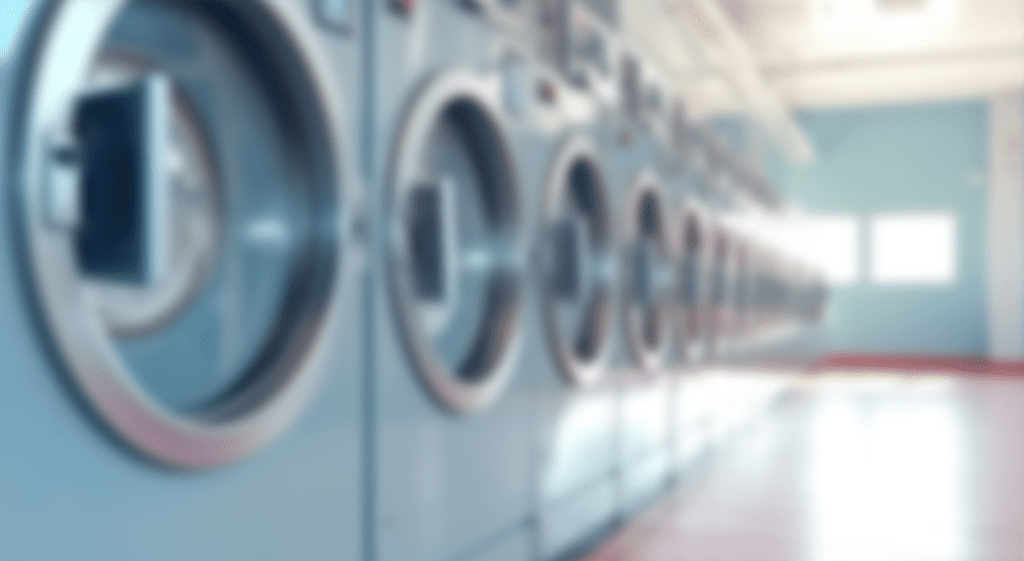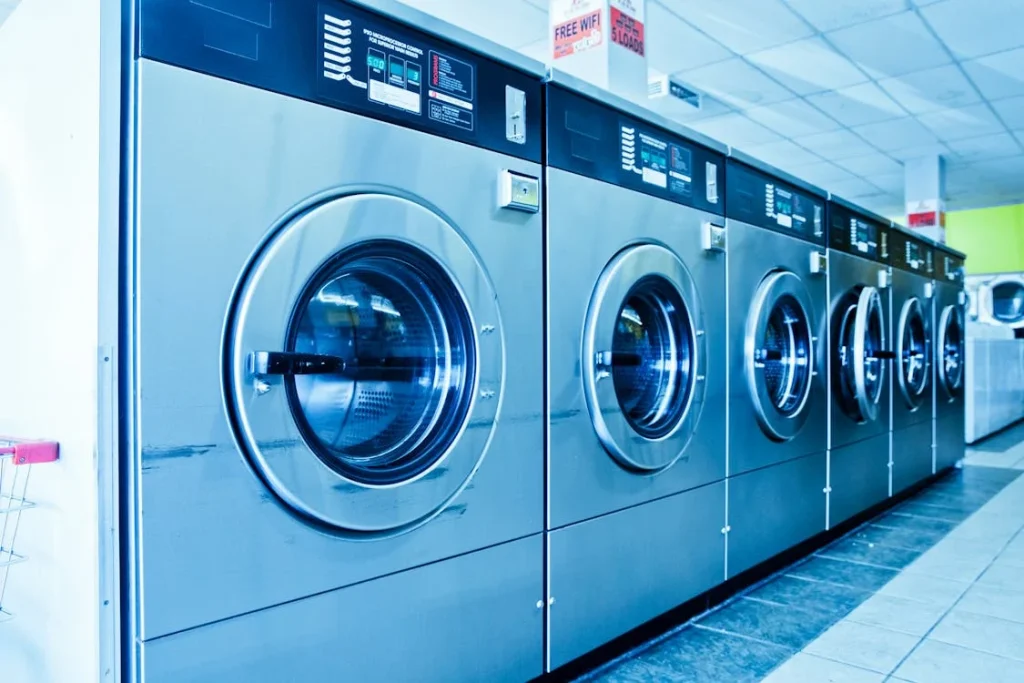Industrial washer dryers are integral to the efficient operation of laundry facilities. However, like any other piece of machinery, they can experience a variety of issues that affect their performance. Fortunately, many of these problems can be diagnosed and resolved through simple troubleshooting steps. In this article, we will cover how to identify common problems with industrial washer dryers, provide solutions, and discuss preventive measures to keep your equipment running smoothly.
Tabla de contenidos
- 1. Understanding Industrial Washer Dryers
- 2. Common Issues with Industrial Washer Dryers
- 3. Preventative Maintenance Tips
- 4. When to Call a Professional
- 5. Conclusion
- 6. FAQs

Before diving into the specifics, if you need expert assistance or want to explore high-quality industrial laundry solutions, don’t hesitate to visit Spinwashing’s Industrial Laundry Page.
1. Understanding Industrial Washer Dryers
Industrial washer dryers are built for high-demand environments, offering efficient washing and drying capabilities. These machines are designed to handle large volumes of laundry, whether it’s for hotels, hospitals, or commercial laundromats. Understanding how these machines function is essential for diagnosing problems effectively.
The core components of a typical industrial washer dryer include the drum, motor, water pumps, heating elements, control board, and various sensors. Each component plays a vital role in ensuring smooth operation. If any one part malfunctions, it can lead to disruptions in the laundry process. By familiarizing yourself with the common issues that arise in these machines, you’ll be better prepared to troubleshoot problems as they come up.
2. Common Issues with Industrial Washer Dryers
Industrial washer dryers, while designed for heavy-duty use, are not immune to issues. Below are some of the most common problems you might encounter.
2.1. Washer Not Starting
One of the most frustrating issues is when your washer dryer refuses to start. If your machine is unresponsive, the first step is to check the power supply. Ensure that the machine is properly plugged in and that the power source is functional.
If the power supply is fine, check the control panel for any error codes. Many machines have diagnostic features that can provide clues about the underlying issue. For example, a common cause of the washer not starting could be a malfunctioning door latch or a faulty start switch. If the control board is faulty, it may need to be reset or replaced.
2.2. Washer Leaking Water
Water leaks are a common issue in industrial washer dryers and can occur for several reasons. The most frequent cause is damaged or worn-out hoses, which can break or develop cracks over time. Inspect all the hoses, including the inlet, drain, and pump hoses, for signs of wear or blockages.
Another potential cause of leaks is a malfunctioning door seal. If the door seal is compromised, water can escape during the wash cycle. In this case, replacing the door seal should resolve the issue.
2.3. Washer Drum Not Spinning
If the washer drum isn’t spinning, your laundry won’t get cleaned or dried properly. There are a few potential causes for this problem. First, check if the machine is overloaded, as an unevenly distributed load can prevent the drum from spinning. Try redistributing the laundry and running the cycle again.
If the load is balanced and the drum still won’t spin, there might be an issue with the motor or drive belt. The motor could be worn out, or the drive belt could have slipped off or become damaged. If you’re unsure, it’s best to consult a professional technician.
2.4. Washer Not Draining Properly
A washer that doesn’t drain water properly can leave your laundry soaked and wet. This issue is often caused by a clogged or kinked drain hose. Inspect the hose for any blockages and clear them if necessary. It’s also a good idea to check the pump filter for debris, as a clogged filter can prevent proper drainage.
In some cases, the pump itself could be malfunctioning. If you’ve ruled out blockages, it may be time to inspect or replace the pump.
2.5. Washer Producing Excessive Noise
Loud noises during operation can indicate several problems. If you hear grinding or squeaking noises, the issue could be related to worn-out bearings or a faulty motor. These parts might need lubrication or replacement, depending on the severity of the damage.
If the noise is a banging or rattling sound, it may be due to an unbalanced load. Always make sure to load your washer dryer evenly to prevent these types of noises. If the noise persists despite proper loading, professional service may be needed.
3. Preventative Maintenance Tips
By performing regular maintenance, you can prevent many common issues from arising in your industrial washer dryers. Below are a few tips to ensure that your machines continue to operate efficiently.
3.1. Regular Cleaning and Inspection
One of the most effective ways to keep your washer dryer in good working condition is through regular cleaning and inspection. Clean the drum and exterior after each use to prevent build-up. Periodically check the internal components, such as hoses and the drain filter, for debris or signs of wear.
3.2. Checking Hoses and Filters
Clogged hoses and filters are common culprits for many washer dryer problems. Make it a habit to inspect these components regularly. Replace hoses that appear frayed or cracked, and clean filters to ensure they’re not clogged with lint or detergent residue.
3.3. Ensuring Proper Load Balance
Improper loading can lead to machine strain and operational issues. Always make sure to balance the load evenly, as an overloaded or unbalanced drum can cause the motor to work harder, leading to wear and tear. Additionally, avoid overloading the washer, as this can affect both the washing and spinning processes.
4. When to Call a Professional
While many issues can be handled with basic troubleshooting, there are times when it’s best to call a professional. If you’re unable to resolve the problem after multiple attempts, or if the issue is more complex, a technician’s expertise may be required.
4.1. Signs That Professional Help is Needed
If the problem persists despite your efforts, it’s a good idea to consult a professional. Below are a few signs that indicate it’s time to call in an expert.
4.1.1. Persistent Issues
If the same problem keeps recurring despite your troubleshooting attempts, this could indicate a deeper mechanical or electrical issue. In such cases, contacting a professional is the best course of action.
4.1.2. Complex Mechanical Failures
If your washer dryer experiences major mechanical failures, such as motor or drum issues, it’s essential to contact a professional. These problems often require specialized knowledge and parts to fix.
5. Conclusion
Industrial washer dryers are powerful machines, but like any piece of equipment, they need regular maintenance and occasional troubleshooting. By understanding the common issues, knowing how to resolve them, and performing preventive maintenance, you can extend the lifespan of your washer dryer and ensure that it operates smoothly. For more information on industrial laundry solutions or to request professional assistance, visit Spinwashing Contact Us.
6. FAQs
1. How often should I clean my industrial washer dryer?
Regular cleaning after each cycle is recommended, with a more thorough inspection every few months to ensure hoses, filters, and the drum are in good condition.
2. What should I do if my washer dryer is making a loud noise?
Check for unbalanced loads first. If the noise persists, inspect the motor and bearings for wear.
3. How do I prevent water leaks in my washer dryer?
Regularly inspect hoses and the door seal for damage. Replace any worn-out parts as soon as possible.
4. Why is my washer dryer not draining?
Check for clogs in the drain hose and filter. If there’s no blockage, the pump may need to be replaced.
5. When should I call a technician for my washer dryer?
If troubleshooting doesn’t resolve the issue or if you experience complex mechanical problems, it’s best to consult a professional technician.
Here are some other articles that we think might interest you:
Environmental Impact of Industrial Laundry


